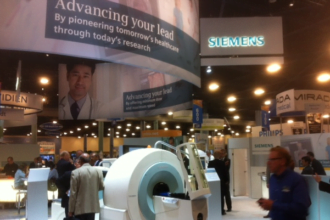
Good old Dad and baby Source: Flikcr Creative Commons
The prophet Ezekiel questioned the justice of God’s punishment of the children of Israel for the sins of their forefathers: “Fathers do eat unripe fruit, and the sons’ teeth are blunted?” (Ezekiel, 18:2). A wonderful metaphor that is apt not only in the original historical context, but in the genetic sense as well.
An incredibly important paper, published in Nature (August 22, 2012), reports on an unexpected discovery: the incidence of schizophrenia and Autism Spectrum Disorder (ASD) is highly correlated to the age of the father at conception. This flies in the face of the widespread belief that it was the mother’s age that somehow was the cause of these psychiatric disorders.
Iceland, the genetically homogenous country
In order to identify genetic mutations that contribute to a certain disorder one must study a population as homogenous as possible. Why? Because the more heterogeneous the population the more mutations there are likely to be, completely “drowning out” the mutations that cause the disorder. Needle in a haystack situation, where the irrelevant mutations are the hay; when you minimize the “hay”, it gets easier to find the “needle”.
Iceland was settled by Norwegian Vikings in the 10th century, and since then there was no other significant migration to the island. Hence, there was plenty of inbreeding and genetic homogenization of the population. Consequently, the island became an ideal laboratory for genetic analyses.
For the study, the investigators from the Icelandic company DeCode Genetics, analyzed the genomes of 78 parents-child trios (two parents, one child), in which the parents had no psychiatric disease and the child had either ASD or schizophrenia. Spontaneous, or de novo mutations which occur at conception are actually quite common. Most of them are harmless, but some rare ones are associated with an increase in the incidence of schizophrenia and autism.
Why should the time around conception be so vulnerable to mutations? Because the sperm cell divides at a relatively fast rate, about every 15 days, and every cell division is accompanied by mistakes, namely mutations. Nothing is perfect. The researchers were able to determine that sperm cells accumulate about 2 mutations per year, so the number of mutations of a 20 year old, for instance, which on average has 25 mutation, will double in 16.5 years, or by the time he is 36-37 years old to carry 50 mutations. The mother, on the other hand, who carries about 15 random mutations, does not contribute to an increased incidence of autism or schizophrenia because the egg is much more stable and does not accumulate mutations with advancing age.
Why psychiatric disease?
The answer is probably because it’s a numbers game. About 50% of all the genes are involved in brain development (amazing how much genetic “firepower” is required for this one organ; none of the others come even close). So obviously this makes the brain a big target for those random mutations.
What about the environment?
Many epidemiological studies showed that environmental (presumably non-genetic) factors contribute to the incidence of ASD and schizophrenia. Are these studies wrong? Not at all. What it means is that a child of a 20 year old father is less vulnerable to environmental influences than the child of a 40 year old.
In any event, this study goes a long way toward explaining the recent rise in the incidence of childhood autism. People are getting married and having children at later and later age, and this is probably the consequence.
The other surprise
The finding that sperm accumulates 2 mutations a year is bound to throw another field into a major reassessment: Anthropology. When molecular anthropologists determine when one species diverges from another they use a “molecular clock”. By counting the number of mutations by which humans, for example, is different from chimpanzee it can be calculated when they diverged from the common ancestor. The assumption was that mutations accumulated at a rate of about 7 per year. Now that we know that the rate is only 2 per year, what would it do to our assumptions about the timing of the emergence of different species? It’s going to be great fun to follow the re-dating. Watch for fundamentalists who believe that Adam and Eve walked with the dinosaurs to cite this study as proof. Is It? Of course not. The dinosaurs lived hundreds of millions years ago, and became extinct 30 million years ago. We diverged from chimpanzees about 4 million years ago according to the “old” molecular clock, so probably this will have to be adjusted to something like 8 million years ago. Rest assured, no amount of change in the molecular clock would put us in a Jurassic Park world. This will still be confined to sci-fi books and movies… and to Christian fundamentalists.
.
The post Father’s Age and Child’s Psychiatric Disease –What’s the Connection? appeared first on The Doctor Weighs In.







